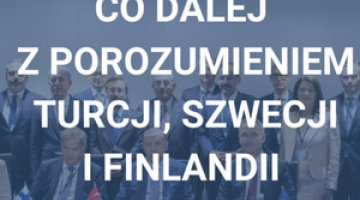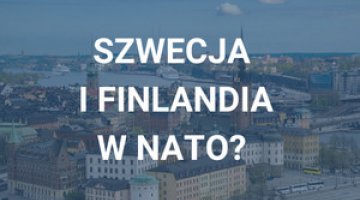Finland becomes NATO’s thirty-first member state

On 4 April, the seventy-fourth anniversary of NATO’s foundation, Finland became its thirty-first member. On that day, Turkey – the last country to approve Finnish membership in the Alliance – handed over its ratification documents to the US State Department. This allowed NATO to issue a formal invitation to Finland which submitted its instrument of accession. Helsinki thus formally became a party to the North Atlantic Treaty.
Finland and Sweden simultaneously submitted their applications to join NATO on 18 May 2022. A few days earlier, Ankara made far-reaching demands to both countries regarding the fight against terrorism and blocked the start of the accession negotiations. The two countries signed a trilateral memorandum with Turkey at a NATO summit in Madrid in June 2022, which opened the way for the two Nordic states to be invited to discuss the political, military, financial and legal conditions for membership, to sign the protocols enabling their accession, and started the process of ratification by the allies.
Under the trilateral memorandum, Stockholm and Helsinki agreed to counter the activities of the PKK’s Syrian-based sister groups (the PYD and the YPG) in both countries, to make changes to the country’s penal codes to combat terrorism, to lift the embargo on arms exports to Turkey, and to consider Ankara’s requests to deport terror suspects, as well as to combat disinformation and the financing of organisations it considers terrorist (in addition to the PKK, these include the Gülen movement and the DHKP/C). Both countries have begun to take steps towards meeting Turkey’s expectations, although according to Ankara these have still been insufficient in Sweden’s case.
The process for ratifying Finland’s and Sweden’s accession came to a halt in mid-October 2022, after all the members but Hungary and Turkey had completed their national proceedings. After anti-Turkish demonstrations and the burning of a Koran near the Turkish embassy in Stockholm in January this year, President Recep Tayyip Erdoğan ruled out the ratification of Swedish NATO membership. In mid-March Turkey agreed to separate the accessions of Helsinki and Stockholm. On 27 March, Finland’s accession protocol was approved by the Hungarian parliament, and a day later the Hungarian president appended her signature. On 31 March, Hungary submitted its instruments of ratification to the US State Department. The Turkish parliament voted it through on 30 March, with Erdoğan signing a day later.
Commentary
- The Finnish government, which had long maintained the narrative that it needed to join NATO jointly with Sweden, changed its mind earlier this year in the face of Turkey’s opposition to Sweden’s accession. Finland is aware that its strategic situation is different from Sweden’s due to the long land border it shares with Russia. Helsinki could not afford to remain a NATO candidate for much longer without formal guarantees from the Alliance. For this reason, in early March the Finnish government prepared for the possibility of joining separately by voting through the package of laws it needed for membership. The decision furthermore made the process independent of the Finnish parliamentary elections and the time needed to form a coalition government.
- The ratification process of Finland’s membership in NATO has been remarkably quick despite Turkey’s objections. Less than a year has passed between formal application and full membership. The change in Ankara’s position toward Finland was mainly because Turkey has had fewer objections against Finland than it has against Sweden. One reason for this is that the Kurdish diaspora in Finland is relatively small, not as politically active as that in Sweden, and is mainly from Iraq.
- The outcome of Finland’s 2 April parliamentary elections will have little impact on Finnish security and defence policy. NATO issues were not a significant element of the pre-election debate. Both Finnish society and the political class have made a profound policy re-evaluation after the Russian attack against Ukraine. The centre-right National Coalition Party, which has been in opposition since 2019, won the election (with 20.8% of the vote) under the leadership of Petteri Orpo. Until 2022, it was one of two parties in parliament that had openly supported Finland’s accession to NATO for many years. The process of forming a new cabinet will take up most of the coming weeks, but regardless of the final shape of the coalition – either with the currently governing Social Democrats (who won 19.9% support) or the Finns Party (20.1% of the vote) – Helsinki’s attitude toward NATO membership will not change.
- For Finland, NATO membership formally marks a profound change in its security doctrine. The country had hitherto described itself as non-aligned, primarily developing its own defence capabilities, and prioritising its cooperation with the similarly non-aligned Sweden while maintaining good political and economic relations with Russia. After 2014, however, Helsinki began to strengthen its military relations with the US and NATO. For its citizens, who had previously been sceptical about membership in the Alliance (with only 24% support in 2021), Russia’s brutal aggression against Ukraine was a shock that prepared the ground for a fundamental revision of state policy. In parallel with the change in the public mood, the political elite concluded that in the face of Russia’s neo-imperial ambitions, Finland’s current strategy would not guarantee its security in the longer term. Thus, in March 2022, the process of forming a political consensus on accession to the Alliance began. After more than a month of debate, and with growing popular support for joining (which reached 76% last May), President Sauli Niinistö and Prime Minister Sanna Marin officially expressed support for membership in mid-May, and the Finnish parliament then voted 188 to 8 in favour of applying to join.
- Finland’s accession to NATO will change the balance of power in the Baltic Sea region in favour of the Alliance, strengthen deterrence policy, and force Russia to revise its calculations regarding the possible use of force against any of the allies in the region. It will also prevent Russia from taking advantage of Finland’s non-alignment to conduct possible military operations against the Baltic states, and make it easier for NATO to defend those countries. NATO regional defence plans will be extended to Finland; that also means the country will participate in collective defence operations in Norway, the Baltic states and Poland. Finland will also commit to developing certain military capabilities as part of NATO’s defence planning. It will take part in the NATO’s high readiness forces, strengthen allied naval forces, and will most likely participate in the Baltic Air Policing and NATO’s enhanced forward presence on NATO’s eastern flank. However, Finland may remain cautious about hosting allied forces on its territory due to concerns about Russia’s possible reaction; Helsinki could justify its reticence by saying that its own armed forces are sufficiently capable of defending the country in peacetime.
- At the same time, security in the Nordic-Baltic region will not be complete until Sweden becomes a full member of NATO. After Helsinki’s admission to the Alliance, however, Stockholm’s accession may be delayed. The Hungarian government is unlikely to ratify its application without Turkey’s prior approval, and Ankara will not make any decision before the political situation stabilises after the presidential & parliamentary elections scheduled for 14 May. Thus, it is unlikely (though not impossible) that Sweden will become a member of NATO before the July summit in Vilnius. On 1 June, an amendment to the anti-terrorism law will come into effect in Sweden, fulfilling one of Turkey’s demands of Stockholm. However, it remains unclear whether this will satisfy the new government in Ankara and whether the other allies, including the US, will be willing to make concessions to Turkey concerning cooperation in the arms industry; that would theoretically enable the Swedish accession protocol to be ratified more quickly.




